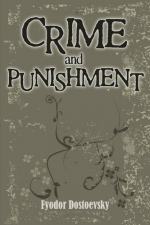|
|
Crime and Punishment Topic Tracking: Sin/Transgression
Chapter 2
Sin/Transgression 1: Marmelodov readily acknowledges his sin and shame, but he pleads for the forgiveness of Sonia's sin, which, he believes, is highly forgivable because it is motivated by love. Marmelodov hopes that Christ will forgive all sinners, especially those who consider themselves unworthy of such grace and mercy.
Chapter 5
Sin/Transgression 2: Upon hearing by chance that Lizaveta would be away the net day at a certain time, Raskolnikov feels that the decision has already been made for him. He feels like a man condemned to death-some force within him is making him go through with the murder.
Chapter 7
Sin/Transgression 3: Raskolnikov finally crosses the line between theorizing about the murder and actually going through with it. Raskolnikov has justifications for killing the old woman, but the murder of Lizaveta is unplanned and unjustified. He kills an innocent person in order to accomplish his plan.
Chapter 8
Sin/Transgression 4: Raskolnikov begins to think that his reason and will are failing him, a sure sign that he is not beyond the guilt of his conscience. In his theory, extraordinary men are above such feelings. Ordinary men, however, are punished by their consciences.
Chapter 19
Sin/Transgression 5: Razumihin argues against modern notions that crime is only an expression of revolt against the environment. He believes in the human soul's moral responsibility. Porfiry brings up the subject of morality within the context of Raskolnikov's idea that some extraordinary people have the right to overstep the boundaries of morality. For them, there is no need for moral justification, responsibility, or consequence.
Chapter 24
Sin/Transgression 6: Raskolnikov cannot understand how Sonia's innocence and purity can be reconciled with her role as a prostitute. He believes that she is much like him, a murderer-she has taken a life, her own.
Chapter 30
Sin/Transgression 7: Raskolnikov confesses to Sonia that he killed the woman as an experiment, to see whether he was a man or a louse. If he were a man, he would not feel guilt. He discovers, to his disappointment, that he is a louse. Raskolnikov, who is still hanging onto a sense of self-importance, considers the common man to be unable to step beyond his conscience. The extraordinary man, on the other hand, is able to transgress the law and pave his own way.
Chapter 35
Sin/Transgression 8: Svidrigailov is a man who lives for fleshly pleasures. He has no qualms about seducing and manipulating people to get his way. Having disregarded all forms of morality and conscience, Svidrigailov is living out Raskolnikov's theory of the extraordinary man, one who is able to transgress the law without consequence.
Epilogue
Sin/Transgression 9: Raskolnikov has a dream about a plague that sweeps over mankind. The plague makes people think that they possess the truth with such force that they end up killing each other over their disputes. Society turns chaotic; there is no sense of order. Everything is transgressed. This world represents Raskolnikov's theories taken to their extremes. The dream haunts Raskolnikov.




